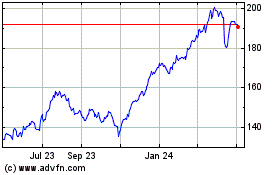By Nina Trentmann
European companies could be forced to move financial instruments
worth billions of euros as Britain prepares to leave the European
Union. The process, known as repapering, might be required for
syndicated loans, currency swaps and other derivatives taken out by
EU-based corporates and booked through banks in the U.K.
Depending on the course of the Brexit negotiations, regulations
that currently cover the City of London, the heart of the U.K.'s
and Europe's financial industry, may stop applying as early as
March 2019. That could make it necessary to relocate thousands of
financial products used by corporates to an EU-based financial
entity.
Company executives, mired in uncertainty about the final outcome
of the divorce negotiations, could face significant amounts of
paperwork -- and additional costs.
"CFOs and treasurers are trying to ascertain what Brexit means
for their financing arrangements," said Stefan Behr, head of
corporate banking for Europe, Middle East and Africa at JPMorgan
Chase & Co. "There are thousands and thousands of financial
contracts...which could potentially be affected."
Loans, securities and derivatives totaling approximately EUR2.4
trillion ($2.7 trillion) might have to be shifted to EU-based bank
entities if Britain becomes a so-called third country after a hard
Brexit, according to estimates by consulting firm Boston Consulting
Group U.K. LLP. About 68% of all trading in the City of London is
done on behalf of clients, including corporates, from EU-member
states, BCG said.
Negotiators for the U.K. and the EU are still working on a
separation agreement that would set the terms of Britain's
departure from the bloc and clarify the rules for financial
services in the future. Lacking that, treasurers, lawyers and
advisers are struggling to come up with definitive answers about
whether financial instruments will have to be altered.
A weekend summit between U.K. and EU representatives failed to
resolve differences, slimming the odds of a deal later this week
when EU leaders meet to discuss Brexit. The Bank of England earlier
this month urged the EU to take steps to allow existing financial
contracts to be honored after the U.K. leaves the bloc to avoid
costs for banks and businesses.
Deutsche Bahn AG, the German rail operator, is among the
companies evaluating their London-based financial instruments. The
firm has interest-rate and foreign-currency swaps totaling EUR5.5
billion, some of which are booked through London.
It is unclear whether existing derivatives can be relocated from
a U.K.-based bank to an EU-based bank without impacting Deutsche
Bahn's hedge accounting, according to Wolfgang Bohner, head of the
firm's finance and treasury department. The company is still
waiting for a definitive response from its auditors, he said.
Connected to that is the question of whether existing contracts
have to be rewritten or duplicated, or whether the changes will
only apply to future instruments. "The conversion or renegotiation
of master contracts causes a significant bureaucratic burden that
can take months," Mr. Bohner said.
The company has not made any changes yet, but is considering its
options, said Mr. Bohner.
This is similar to other large businesses that might be affected
by the changes in regulation, according to JPMorgan's Mr. Behr. "We
don't intend to execute until we know the final outcome of the
negotiations," said Mr. Behr. The time for that is running out, as
both the U.K. and the EU parliament need to ratify any deal before
Britain's scheduled departure in the spring of 2019.
As a result, companies may remain in limbo until they know
whether the U.K. will be granted equivalence status by the EU. That
scenario would require less change and would likely be accompanied
by a transition period to avoid disruption.
Under an EU equivalence arrangement, financial firms based
outside the bloc can offer a limited range of services to European
customers, provided their home country's financial regulations are
broadly similar to the EU's. Compared with today, equivalence would
mean less freedom for U.K.-based banks to do business on the
continent, as the current passporting regime allows British banks
to operate freely across all EU member states.
Keeping the passport would require the U.K. to remain part of
the EU's single market. Prime Minister Theresa May said in January
2017 the U.K. would leave the single market. She has since proposed
it should remain in the single market for goods, but not for
services such as banking.
If the U.K. isn't granted equivalence status, making use of
sterling cash pools could also become more complicated, said
Stephen Baseby, technical director at the Association of Corporate
Treasurers in London. Having both sterling and euros in a single
pool -- a practice used by many European corporates -- might
require additional short-term currency swaps, adding costs for
companies and paperwork for banks, said Mr. Baseby. "The process
wouldn't be as fluid any more," he said.
Further issues could arise around clearing. An acrimonious
divorce between the U.K. and the EU could cut European customers
off from U.K.-based clearing houses, even though certain
derivatives -- for metal, for example -- only trade in London. The
Bank of England last week warned that over-the-counter derivatives
totaling GBP41 trillion ($53.8 trillion) at U.K. clearing houses
could be at risk should negotiations between the U.K. and the EU
break down.
RWE Supply & Trading GmbH, a subsidiary of German energy
company RWE AG, currently relies on London-based banks to clear its
trades. Changes to the current setup could cause additional costs
of several hundred million euros, said Karl-Peter Horstmann, head
of markets regulation at the RWE unit. Repapering some of its
interest rate and currency swaps would add to the bureaucratic
burden, said Mr. Horstmann. "This is presenting us with significant
difficulties," he said.
Amid this uncertainty, treasurers are expanding the portfolio of
banks they do business with, reinforcing an existing trend, said
Michael Dakin, a partner at Clifford Chance LLC. "Most treasurers
are trying to diversify the products, currencies and banks they are
dealing with," he said.
Large multinationals should be able to make the required changes
to their financial instruments without too much disruption, said
the ACT's Mr. Baseby. "It's the smaller companies, those that have
fewer banking partners and a less diversified portfolio of
financial products, that we are worried about," he said.
Even for large corporates, however, risks remain. It is far from
clear what it would cost companies like Deutsche Bahn to repaper a
large number of financial instruments.
"You don't know whether corporates will pay for this or whether
it will be the banks paying for it," said Eriola Shehu Beetz, a
partner and managing director in BCG's financial institutions
practice.
Write to Nina Trentmann at Nina.Trentmann@wsj.com
(END) Dow Jones Newswires
October 16, 2018 00:44 ET (04:44 GMT)
Copyright (c) 2018 Dow Jones & Company, Inc.
JP Morgan Chase (NYSE:JPM)
Historical Stock Chart
From Mar 2024 to Apr 2024

JP Morgan Chase (NYSE:JPM)
Historical Stock Chart
From Apr 2023 to Apr 2024
